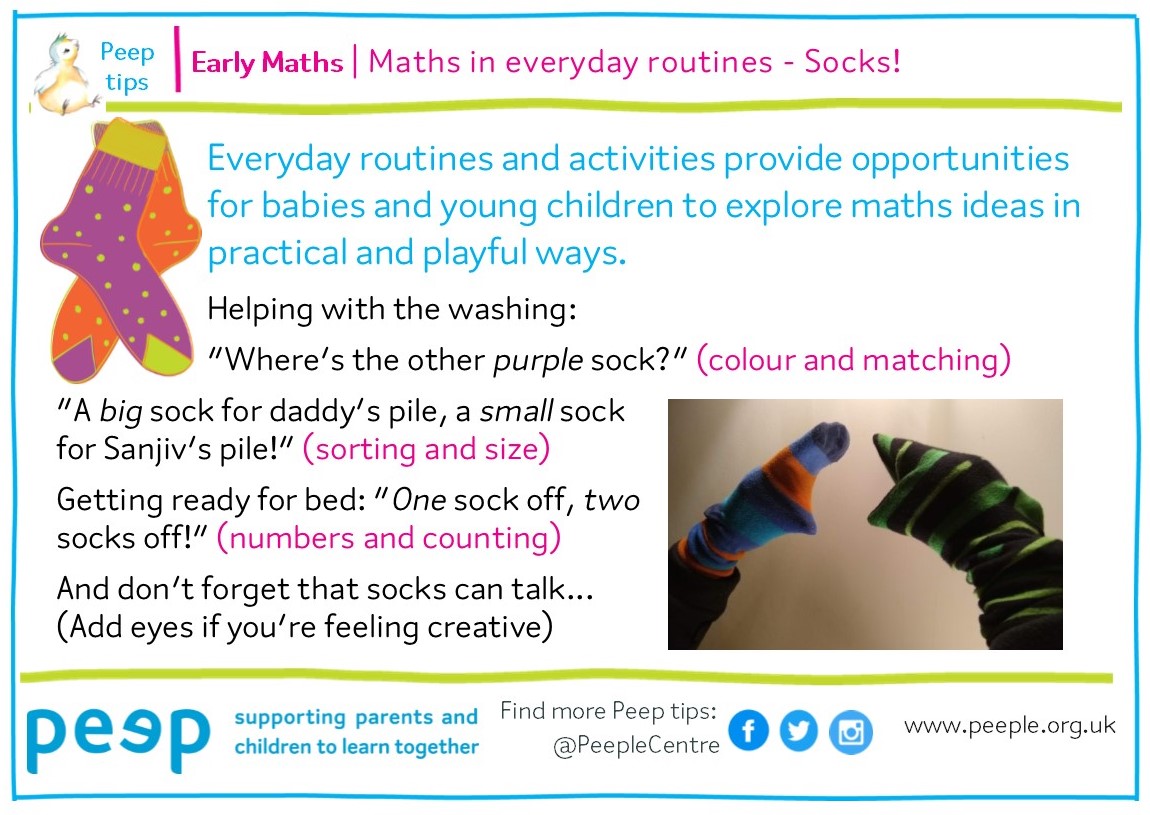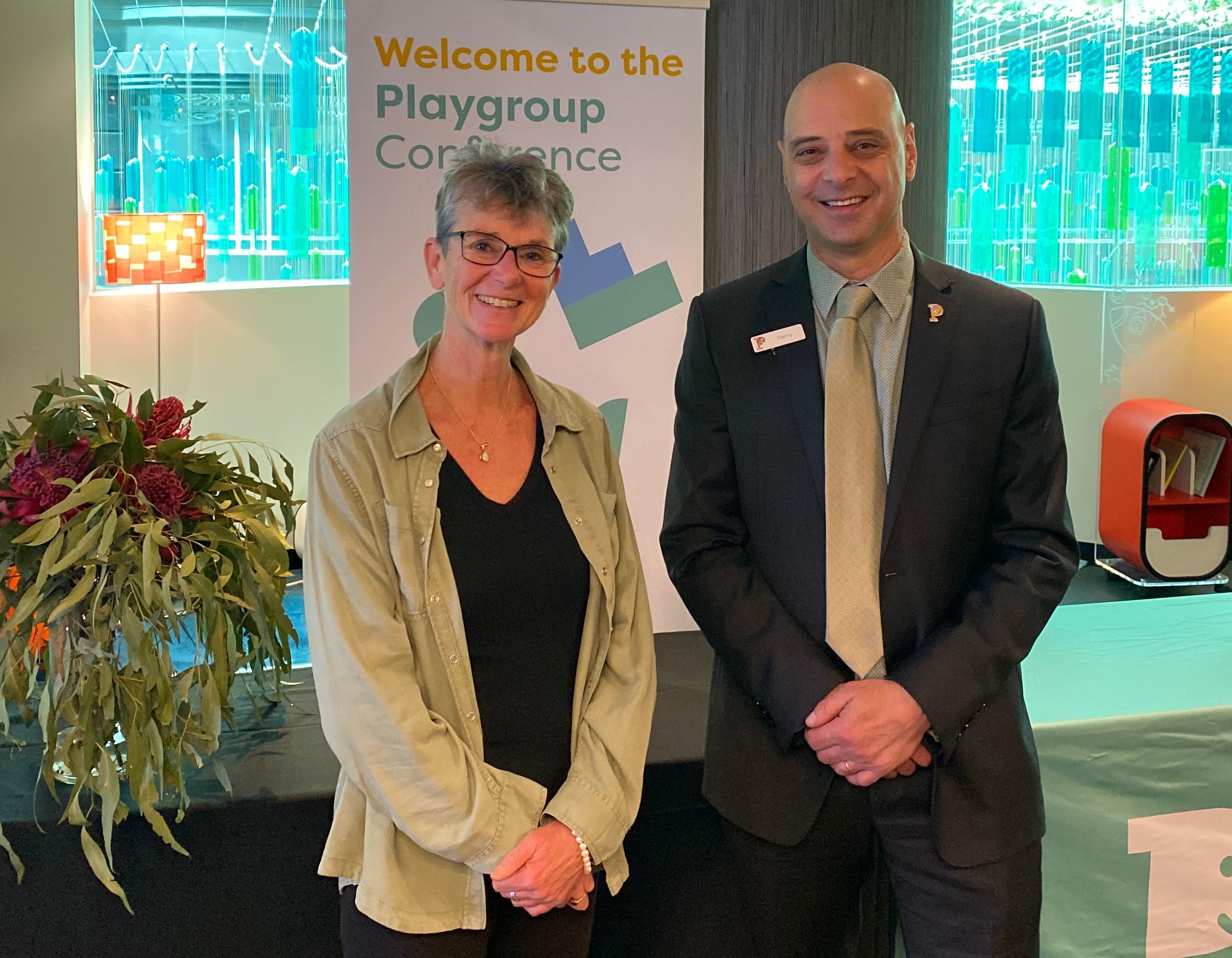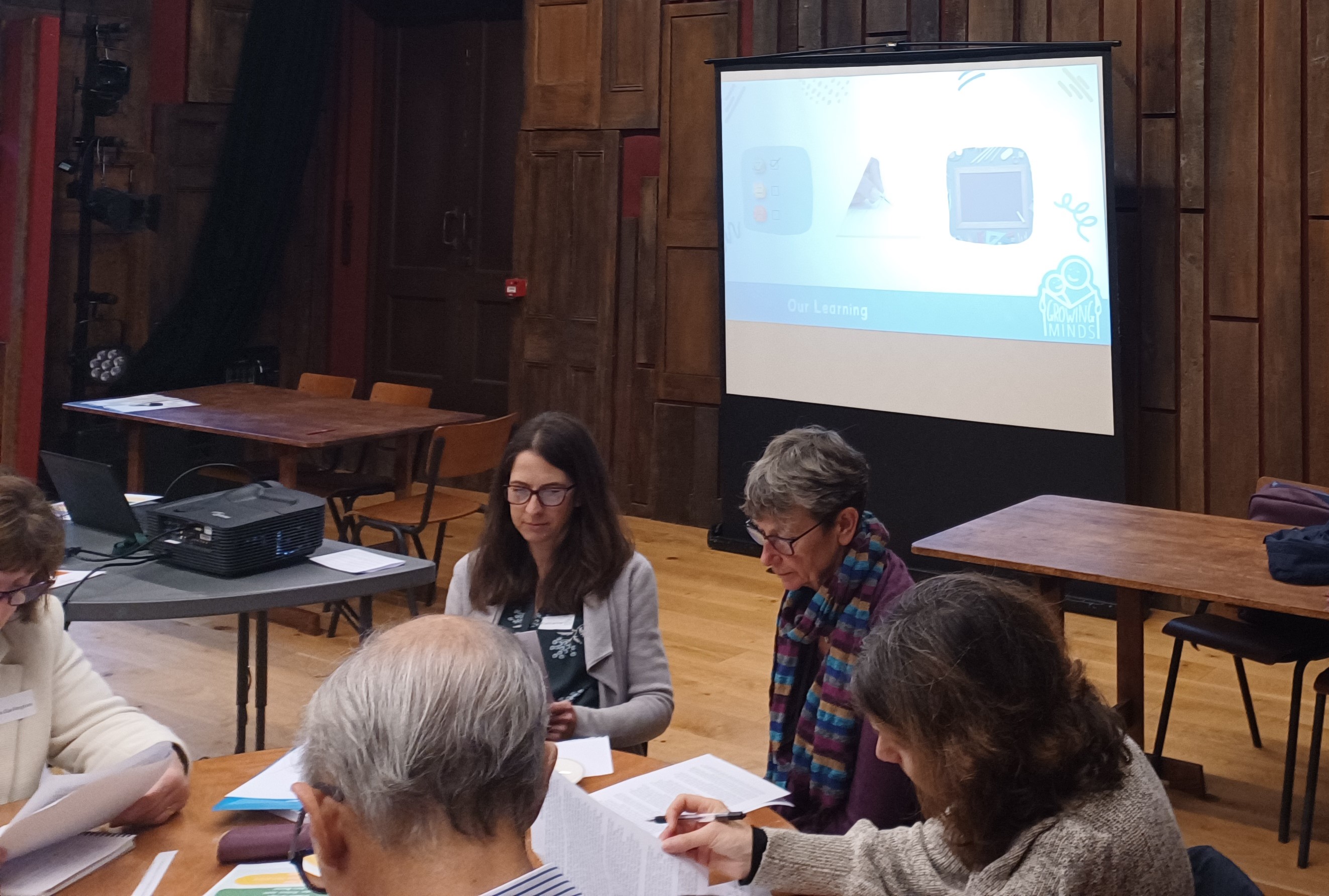Blue
peep progression pathway with Home-Start - building confidence and opening doors
Home-Start Edinburgh West and South West (HSEWSW) have steadily built the Peep provision they offer and the progression support for parents. The Peep Progression Pathway is a key element of this. The three case studies they have kindly shared with us here shows how through the skill and dedication of their staff, and using the Peep Learning Together Programme and Peep Progression Pathway:
- parents who were wary of 'services' have engaged;
- parents and children have fun at Peep;
- the home environment has improved;
- parents have completed qualifications which have taken them nearer their career goals;
- parents have progressed from attending Peep to training as Peep practitioners - gaining qualifications and confidence on the journey.
Margot MacKenzie, Senior Coordinator at HSEWSW highlighted how much she has valued the support from the Peeple Scotland team over the years.
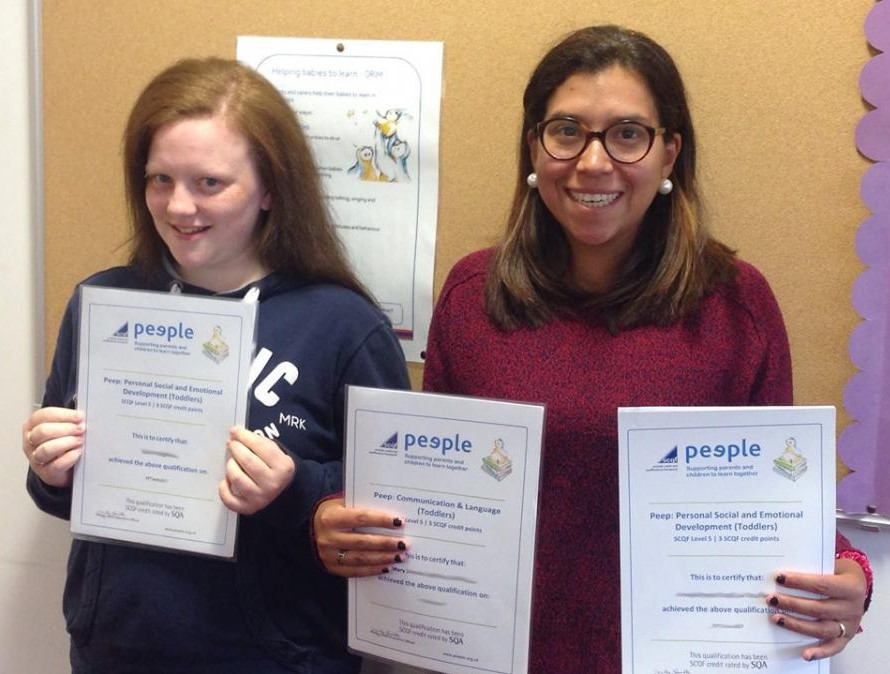
Feature box colour:
'Janey is obtaining real qualifications at the same time as enhancing her parenting skills. This is improving her confidence and helping her on her path to reaching her ambition'
'Susan was proud to share her Peep Progression Pathway workbook at the multi-agency meeting'
'I think it is a really good opportunity for parents to get going and start learning something in a relaxed and carer-friendly environment. You can bring your children' - Hazel, Peep parent
If you would like to find out more about the Peep Progression Pathway, please get in touch: pathway@peeple.org.uk.
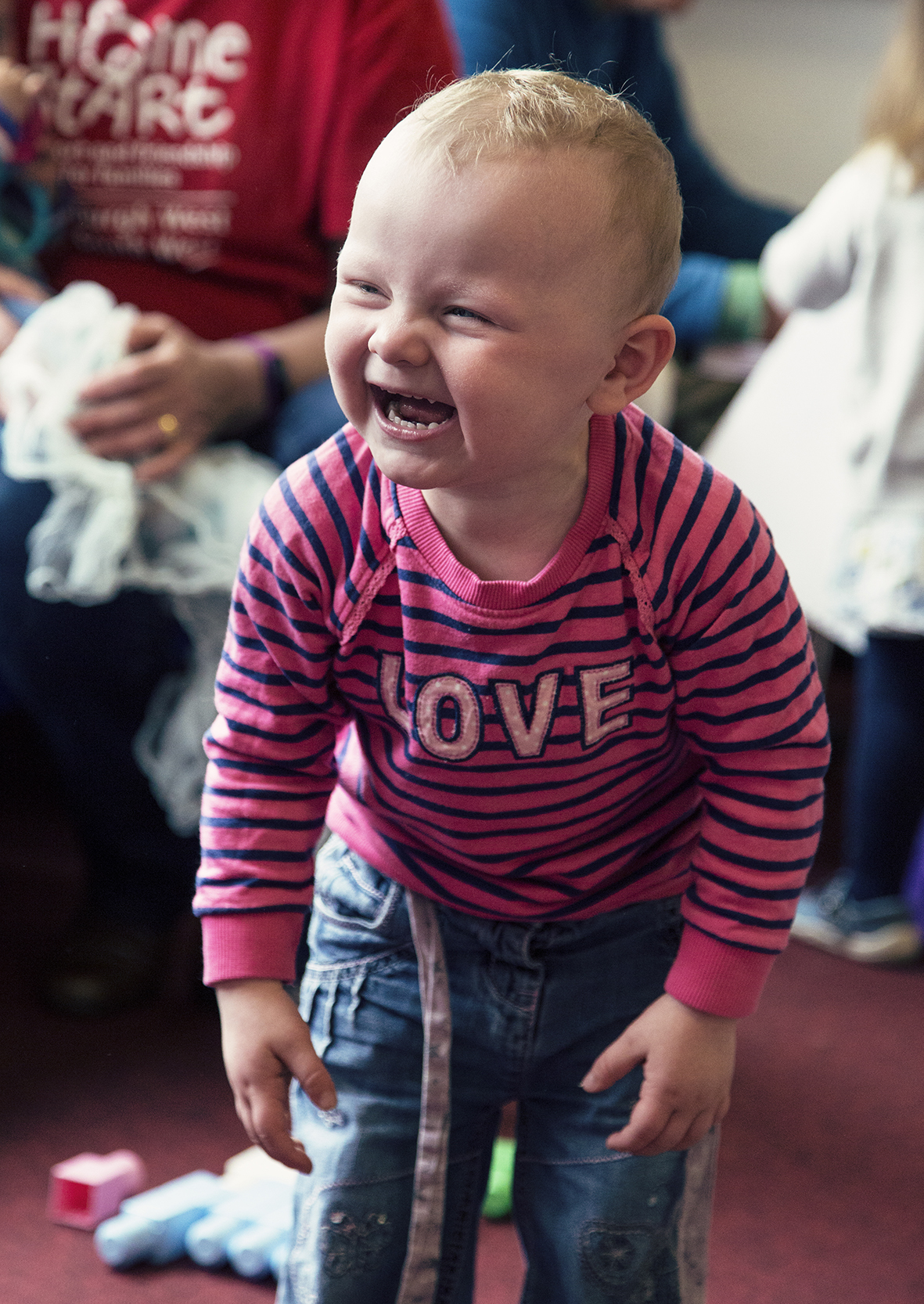
Side Quote Color:
Blog: 3 key messages from new Sure Start research for organisations using Peep Programmes
The new research by the IFS into the impact of Sure Start on children's outcomes was a brilliant validation of the premise on which most of us work. Early intervention can be cost-effective and make a real, positive difference to narrowing the gap in children's outcomes. Sure Start and later Children’s Centres created a one-stop shop for families, bringing together pre and post-natal health services, parenting support including for children with SEND, early learning and childcare, and parental employment support. Similar goals were echoed in Scotland (e.g. through GIRFEC, Getting it right for every child), the Republic of Ireland (e.g. with local Area Based Childhood (ABC) Programmes), and in Australia (through the Playgroup movement).
How is it relevant to Peep practitioners today?
1. Reaching and engaging the families who might benefit the most
As the IFS research found, the positive impacts of Sure Start were greater for the children who lived near the earlier – and better-funded – Sure Start Local Programmes. ‘Much of this extra budget was spent on parental outreach, focused on reaching out to families who were less likely to use and more likely to benefit from Sure Start.’
Most of us these days don't have that same level of funding, BUT there are things we can do to encourage all families to come along. Over the years we have learned from other research on reaching families and gathered tips and experiences from Peep practitioners.
> You can find a list of these practical ideas on the 'Recruiting families and promoting your Peep sessions' page in the login Delivery Support section of the website. If you’re a manager who doesn’t have a login account, just email us at support@peeple.org.uk and we can send you a PDF version of the info. It includes successful recruitment strategies recommended by Peep practitioners, and an action plan of ideas.
2. Having a friendly and good quality offer for families - with a focus on strengthening relationships and narrowing the attainment gap
As well as focusing on outreach, the earlier Sure Start Local Programmes ‘had much more community input into what programmes were offered.’ The Peep Learning Together Programme has a wide range of topics that practitioners and families can choose from, with a common underpinning theme of helping to improve relationships and the quality of the home learning environment. All Peep programmes offer a strengths-based approach, starting where families are, and valuing and building on what they already do.
The IFS research found that children who lived within 2.5km of a Sure Start centre for their first five years performed 0.8 grades better in their GCSEs. However, the effects were six times greater for those eligible for free school meals than for those who weren’t, with an average improvement of three GCSE grades (e.g. getting 3 Cs rather than 3 Ds).
A similar trend was found in the Peep Learning Together Study, a randomised controlled trial (RCT), which measured the impact of the Learning Together Programme on three year olds. Overall the Programme made a positive difference of an additional two months’ progress over a five-month period to children’s early literacy development. But children eligible for the Early Years Pupil Premium made three months' additional progress in early literacy development, and an additional four months' progress in core language skills and in communication.
3. Having a joined-up approach for families is effective and provides value for money
Families involved with Sure Start benefitted from a multi-agency approach to working. Peep-trained practitioners have often found that a joined-up approach adds value for families. This could be by co-delivering their Peep sessions with a practitioner from a different discipline or organisation (as we do locally through our Growing Minds project), or involving other professionals as ‘signposters’ when reaching out to families.
It’s now widely accepted (if not always well-funded) that starting as early as possible – the first 1001 days – can make a real difference. Fore-warned is fore-armed! The Peep Antenatal Programme helps expectant parents understand more about how they can strengthen parent-child bonding and attachment relationships, and about early brain development. The approach can be used in any context, including alongside other antenatal provision.
The expansion in Early Learning and Childcare has been accompanied by a wider recognition of the importance of the ‘early learning’ aspect. Early years settings often deliver Peep programmes for families to strengthen relationships between the setting and families, and to bring together home and setting experiences, information and ideas that support young children’s development.
Parental employment support is another important aspect of joined-up, holistic services, helping to alleviate family poverty and increase opportunities for parents. The Peep Progression Pathway enables Peep practitioners to deliver and assess credit-rated units for families, as part of their Peep sessions. This has led to parents getting back into further education, training or work.
The Sure Start research is a timely reminder of the value – financial and otherwise – of early intervention. Earlier Sure Start research revealed that almost a third of the cost was covered by savings made from reduced hospitalisations of children in Sure Start areas. The IFS (Institute for Fiscal Studies – an independent economics research institute) estimated that Sure Start also resulted in an 8% saving in SEND support, and that the improved school outcomes were equivalent to a benefit of £1.09 for every £1 spent. We all have a part to play in holding governments to account in thinking about the longer term benefits for families in their policy-making.
Feature box colour:
find out more or book training
tel 01865 397 970
training@peeple.org.uk
> training courses
> dates & booking
> sign up to our e-newsletter
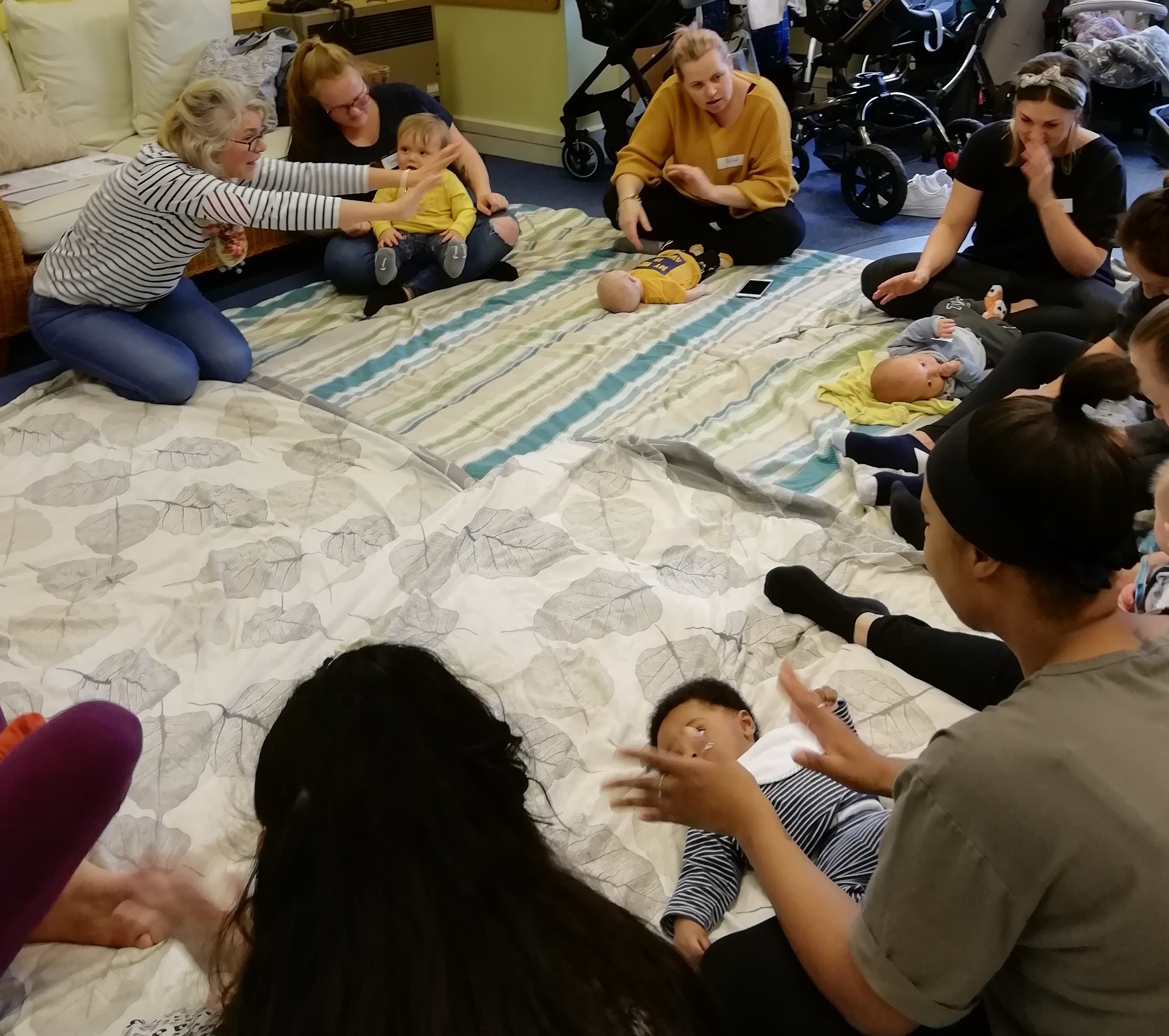
Side Quote Color:
News: update on Peep in Australia – empowering families in every state and territory
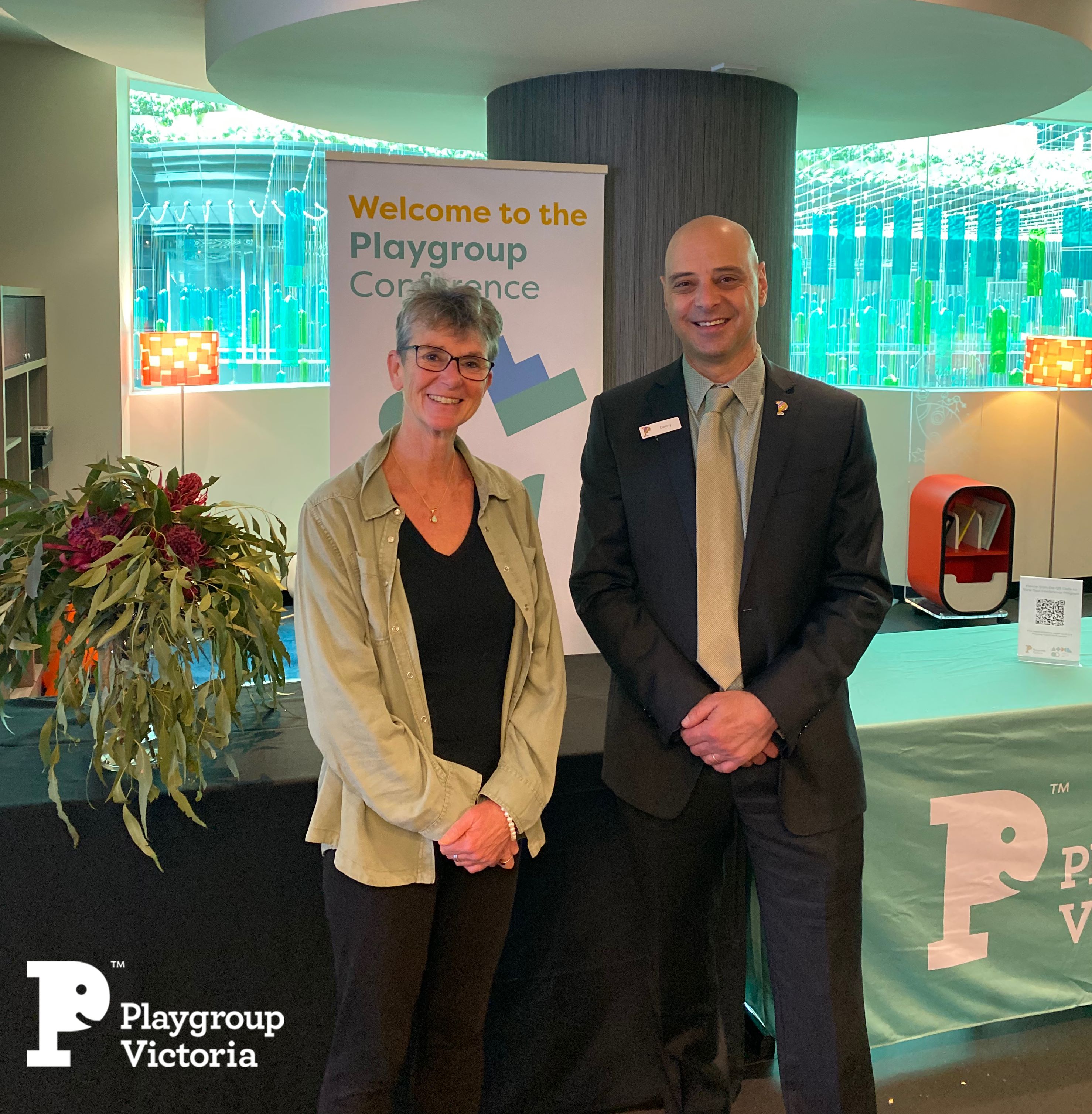 In the autumn, our CEO Dr Sally Smith and our National Training and Accreditation Manager Liz Ersoy visited our Peep partners in Melbourne. Playgroup Victoria hold the exclusive licence for training practitioners to deliver the Peep Learning Together and Peep Antenatal Programmes in Australia.
In the autumn, our CEO Dr Sally Smith and our National Training and Accreditation Manager Liz Ersoy visited our Peep partners in Melbourne. Playgroup Victoria hold the exclusive licence for training practitioners to deliver the Peep Learning Together and Peep Antenatal Programmes in Australia.
Claire Georgiou is Playgroup Victoria’s Peep National Manager and has been at the heart of Peep training and support in Australia for the last few years. By continuing to offer training online, establishing communities of practice and fostering valuable partnerships, the Peep programme is now being used in every state and territory across Australia!
This year Claire will be pulling on her travelling boots, thanks to securing government funding to train and support Peep trainers across five states: Victoria, Northern Territory, South Australia, Tasmania and New South Wales. You can find out more about Peep Training in Australia or contact Claire here: www.playgroup.org.au/for-professionals/peep/.
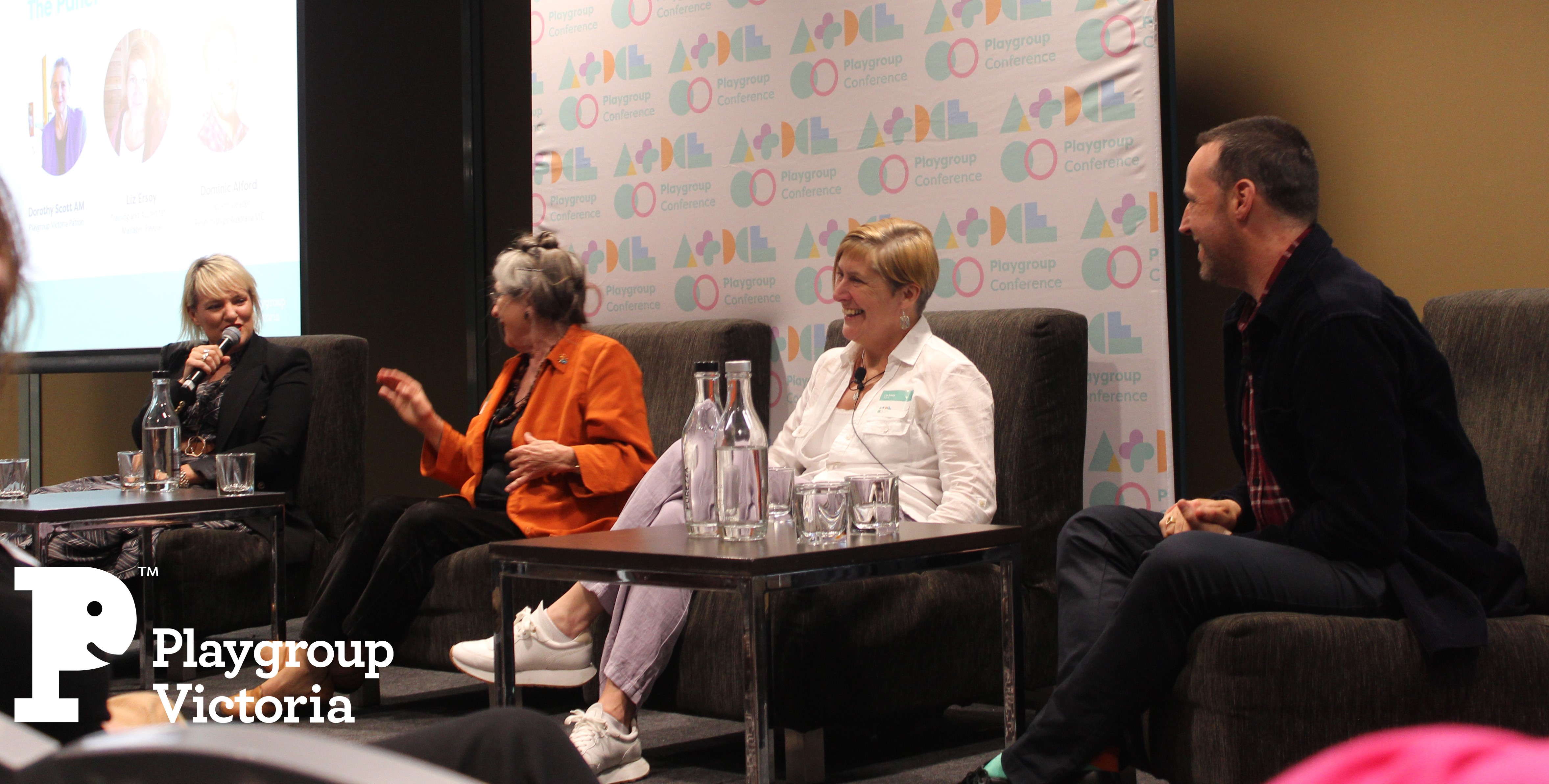
Peep was a focus of the Playgroup Victoria Conference, where 300+ professionals from a wide range of early years settings created a really lively atmosphere.
Sally gave a keynote speech about Peep, Claire led a workshop focusing on Peep and the home learning environment, and Liz participated in a panel discussion focusing on children’s agency in the early years.
The trip also gave Sally, Liz and Claire the opportunity to visit some brilliant Peep groups and have valuable discussions with families, professionals and researchers. These included the Parenting Research Centre, the Australian Catholic University, Thrive by Five, Monash University, the Tomorrow Today Foundation, Milla Milla Aboriginal Playgroup, and many other early years, family support and health organisations.
Images:
Top right: Peeple CEO Sally Smith and Playgroup Victoria CEO Danny Schwarz
Above right (l-r): Panel host ABC broadcaster and writer Jacinta Parsons, Dorothy Scott AM, Playgroup Victoria Patron, Liz Ersoy, Training and Accreditation Manager, Peeple UK, Dominic Alford, Programs Leader, Relationships Australia VIC
Left: Liz, Sally and Claire Georgiou
Below: Playgroup Victoria staff and board, Sally and Liz
Feature box colour:
Read more:
> Interview with Peeple CEO Dr Sally Smith
> Peep in Australia
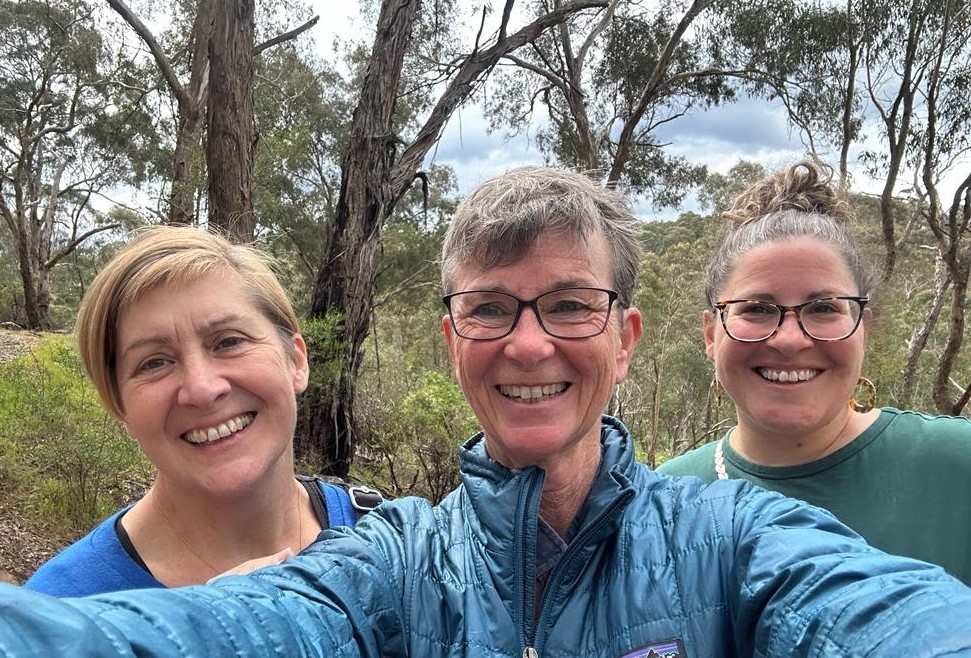
Side Quote Color:
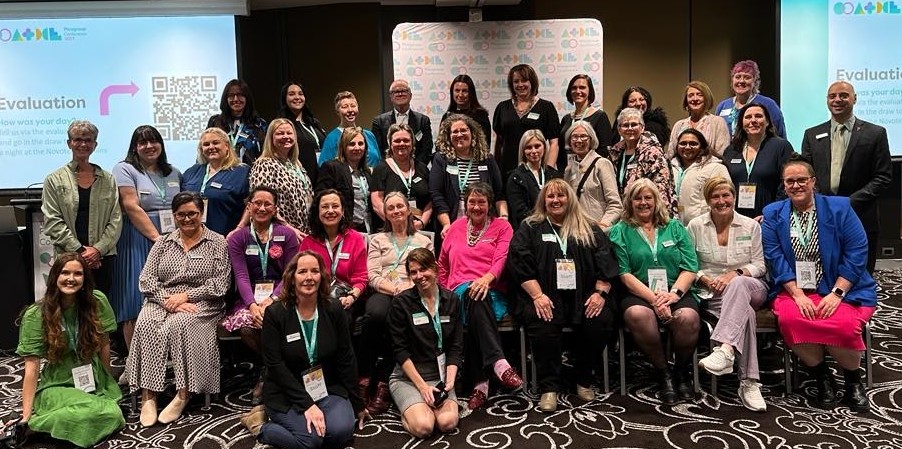
News & Blogs
> Blog: 3 key messages from new Sure Start research for organisations using Peep Programmes
Find out how and why the new research findings are echoed in Peep delivery - from engaging families who might most benefit, to having a joined-up approach, to narrowing the attainment gap - read more
> News: update on Peep in Australia – empowering families in every state and territory
A recent visit enabled our Peeple UK CEO and Training Manager to catch up with colleagues at Playgroup Victoria, the Peep Training licence holder in Australia - meetings lots of families and professionals, and presenting at their conference - read more
> News: Remembering Sir Tim Brighouse - former Peeple Trustee
We were very sad to hear of the death of Professor Sir Tim Brighouse on 16 December 2023. Tim was one of the great minds behind Peeple, and went on to serve as a trustee - read more
> Blog: Growing Minds - lessons learned and getting involved
Our third Learning Event enabled us to reflect on the last few months in our Growing Minds collaborative, community project that helps improve young children's development and outcomes - what we did, what changed within our communities, and what we learned - read more
> News: Narrowing the attainment gap - Learning Together Study update
Further analysis of our RCT study has shown that Peep made the greatest difference to children eligible for Early Years Pupil Premium - they made an additional 4 months' progress in core language skills and in communication, and 3 months' additional progress in early literacy development - read more
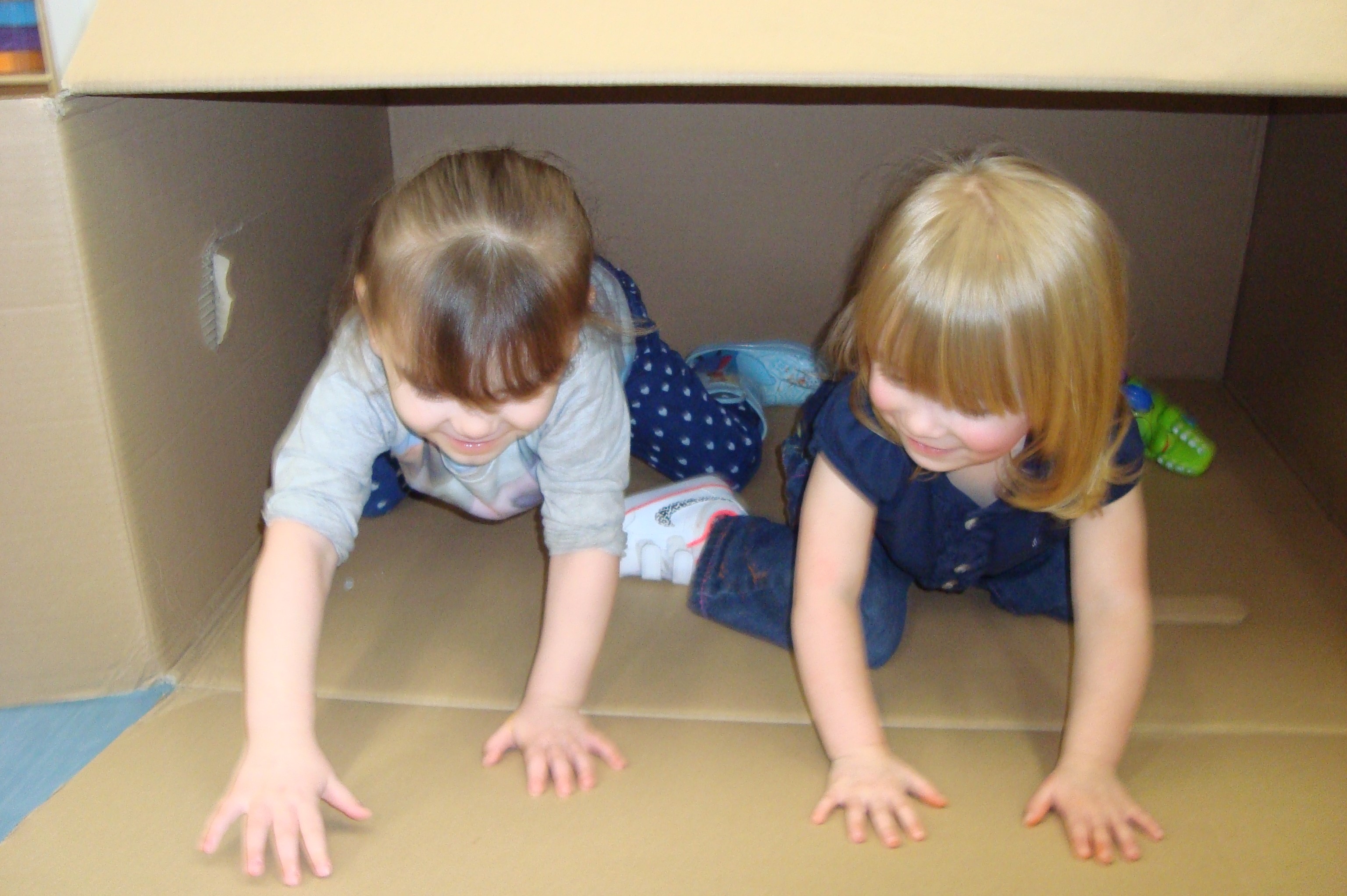 > Blog: Everyday play with free, everyday things
> Blog: Everyday play with free, everyday things
Children love exploratory play, experimenting with the objects around them. When you harness this curiosity together, it might surprise you what fun you can have. Check out our list of everyday objects and ideas for how they can be used in play - read more
> News: Rod's Bicycling for Books campaign to get books into the hands of children is complete!
Cycling 745 miles in 90 hours to raise over £6,000 for Oxford Peep's Dolly Parton Imagination Library - helping to provide the gift of reading by providing a free book every month for local children - read more
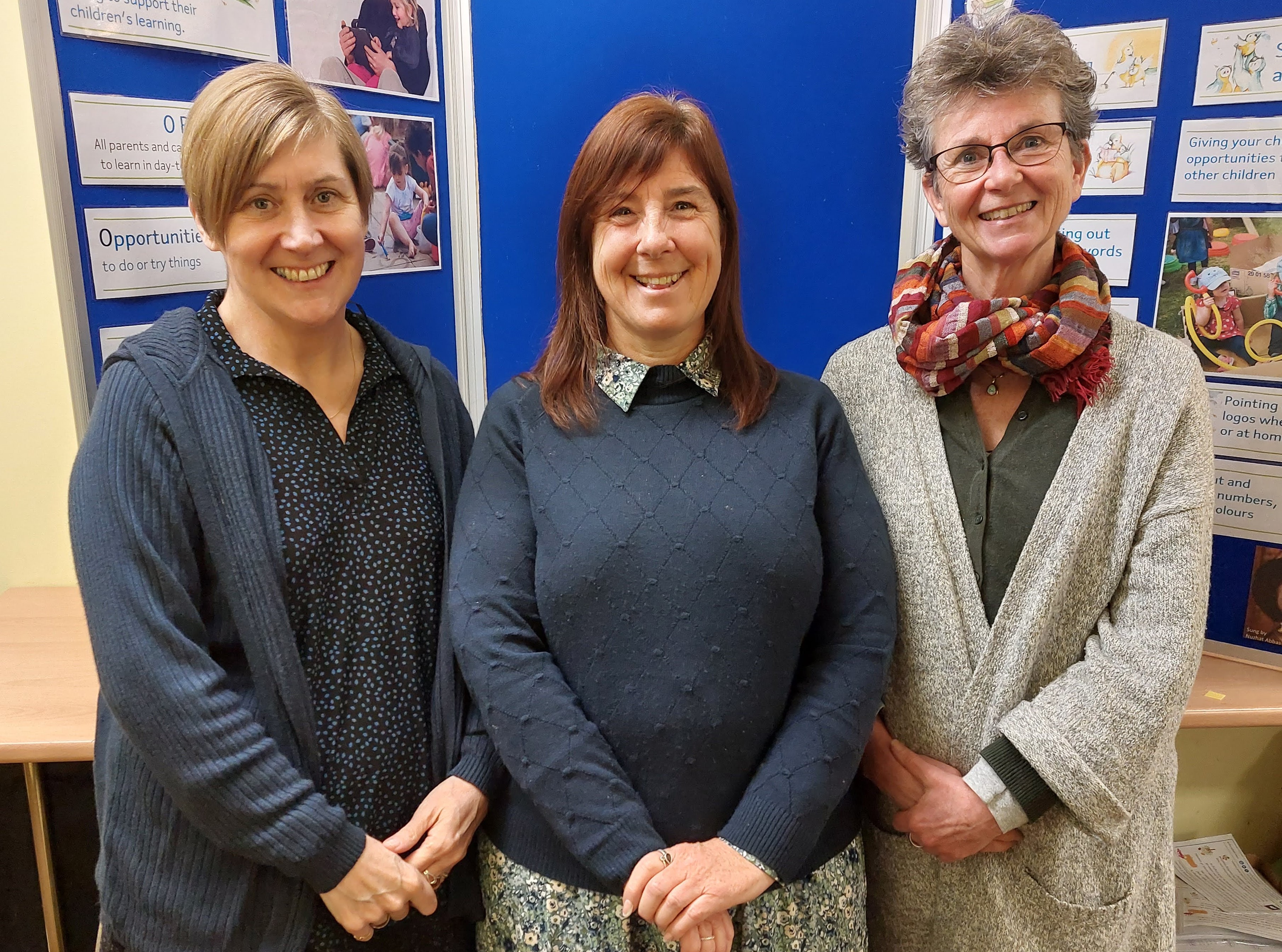 > Blog: Supporting the Peep Progression Pathway - England
> Blog: Supporting the Peep Progression Pathway - England
Our Adult Learning Development Manager for England began her Peep journey back in 2010 as a Children's Centre teacher in Leicester. She's now supporting Peep practitioners to use the Peep Progression Pathway, enabling parents to gain qualification units - read more
> Blog: Ayrshire College's innovative early years offer
Early Learning and Childcare students at Ayrshire College are given the opportunity to support Peep sessions for families, alongside their Peep-trained lecturers - improving their skills and experience in communicating and engaging with parents - read more
Feature box colour:
Side Quote Color:
Blog: Growing Minds - lessons learned and getting involved
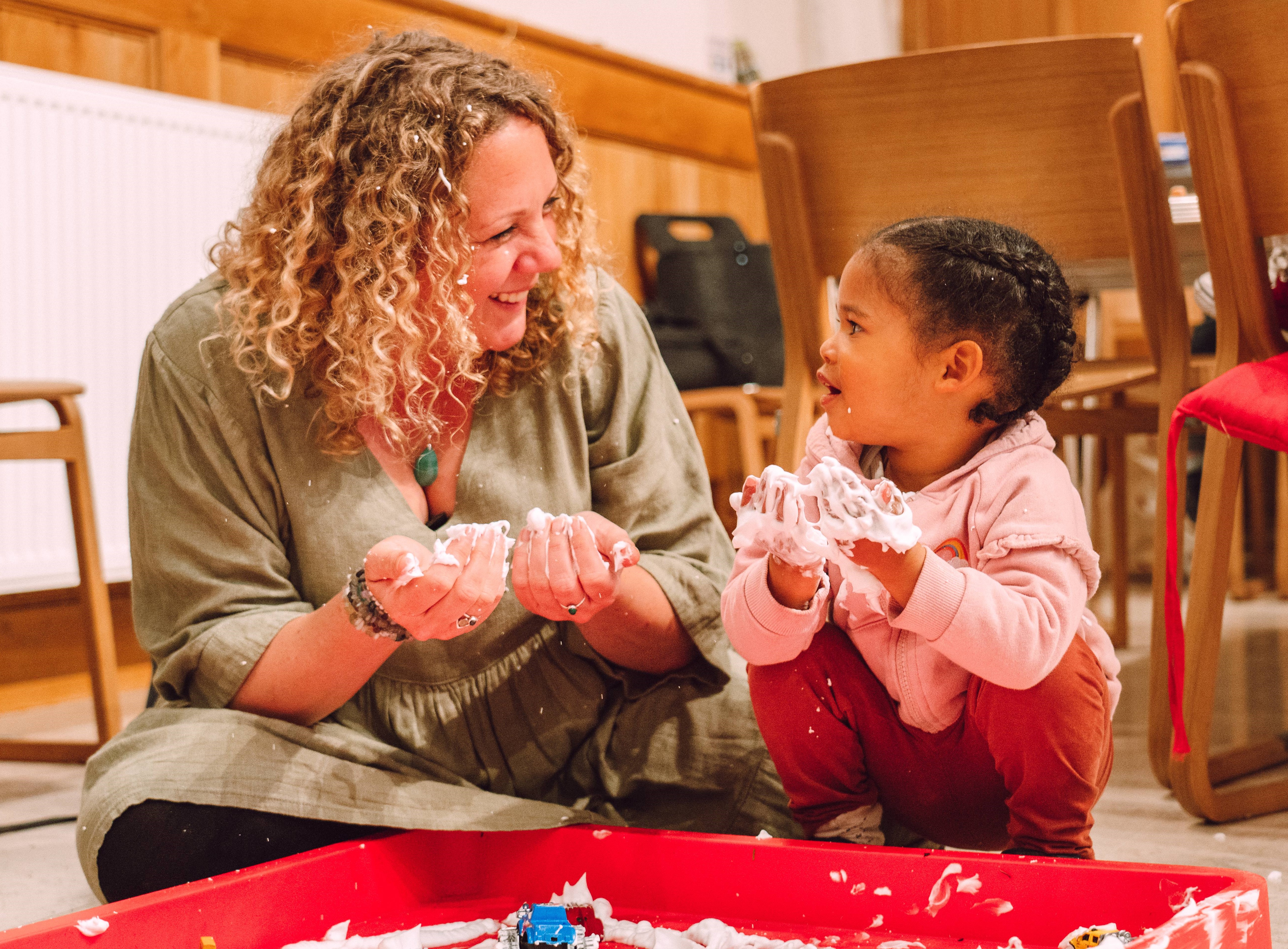
Our third Growing Minds Learning Event in November enabled us to reflect on the last few months - what we did, what changed within our communities, and what we learned - helping us to plan for the year ahead.
Growing Minds is a collaborative, community project that supports and improves young children’s development, school readiness and life chances. We do this by bringing together experienced organisations, local parents and carers, and tried-and-tested interventions. It is led by a partnership of third sector organisations - Peeple, Home-Start Oxford and the Berin Centre – working together in the Littlemore and Berinsfield areas of Oxford and south Oxfordshire.
We really appreciate the positive and thoughtful contributions from everyone who attended, and the generosity of our hosts The Story Museum in Oxford.
Read on – and if you’d like to commission, fund, signpost, find out more, or attend any of our Growing Minds local provision for families - then do get in touch: becky.young@peeple.org.uk.
Here are some of our successes and challenges:
We’re proud of our new 5-minute Growing Minds video, which provides an overview of the project for families and professionals. It captures the voices of partners, practitioners and parents, reflecting on the impact that Growing Minds has had on their lives. Do watch it if you have a few minutes!
Expanding our reach across the communities:
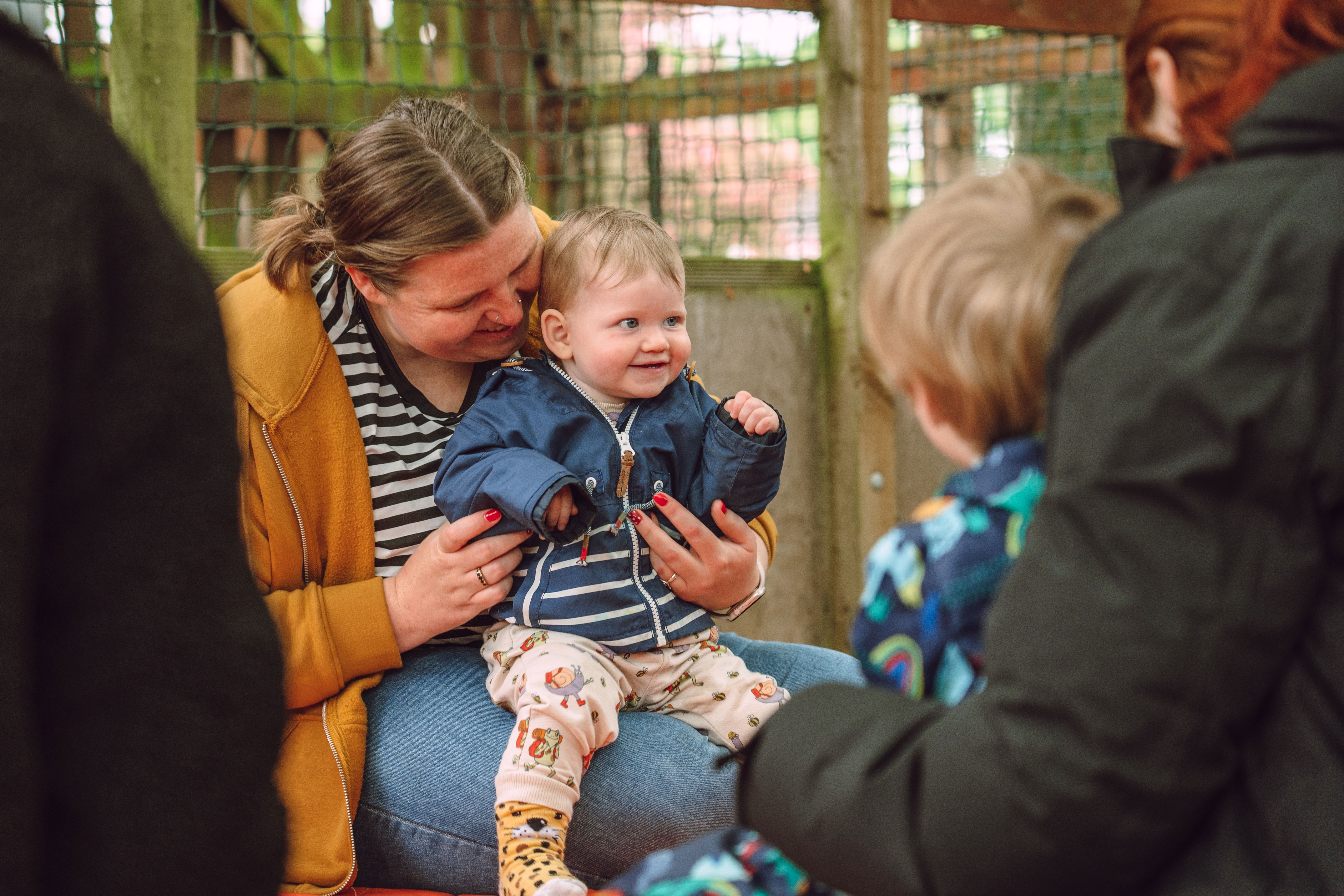 There are now over 500 children registered with Growing Minds. A variety of support is offered, based on families’ interests and needs, ranging from the Dolly Parton Imagination Library books that are posted free of charge to any family wanting to sign up, to Stay and Plays, groups and 1-to-1 sessions for parents and children. Stories shared by Growing Minds parents about their own experiences highlighted the value of this ‘progressive universalism’ approach. For some families, the initial contact about the Imagination Library books provides the first step into accessing other local services. As Sally Smith, Peeple CEO explained, the latest findings from the Learning Together Study show that the Peep Learning Together Programme improves outcomes for all children but has the greatest impact for those living in disadvantaged circumstances.
There are now over 500 children registered with Growing Minds. A variety of support is offered, based on families’ interests and needs, ranging from the Dolly Parton Imagination Library books that are posted free of charge to any family wanting to sign up, to Stay and Plays, groups and 1-to-1 sessions for parents and children. Stories shared by Growing Minds parents about their own experiences highlighted the value of this ‘progressive universalism’ approach. For some families, the initial contact about the Imagination Library books provides the first step into accessing other local services. As Sally Smith, Peeple CEO explained, the latest findings from the Learning Together Study show that the Peep Learning Together Programme improves outcomes for all children but has the greatest impact for those living in disadvantaged circumstances.
School and community links:
Katie Screaton, Executive Headteacher of John Henry Newman Academy, enthused us all with her passionate presentation on the impact that Growing Minds is having in Littlemore. Before it began, there was scarce community support for children under five in Littlemore, so it marks a significant transformation. She pointed out that Growing Minds is fostering a sense of community, diminishing isolation, and boosting parental confidence and enjoyment, helping more parents to see and value their role as educators.
Practitioners from the school and Growing Minds deliver a range of sessions with families, often combining topics from the Peep Learning Together Programme with a particular aspect of everyday life, all of which support children’s development and the home learning environment. Following conversations about cost of living issues, for example, the local St Mary and St Nicholas Church donated a number of slow cookers. These were given to families, who also attended a six-week course where parents and children had fun preparing dinner together (cowboy casserole, anyone?) then taking the food home to cook in their slow cooker.
Other groups include Nature Tots, a Special Educational Needs (SEN) parent support group, and Stay and Play sessions focusing on supporting school readiness. For the Growing Minds children who started in Reception this year (aged 4-5), Katie's initial observations were that they have all settled well, and are confident explorers of the Early Years Foundation Stage.
This is the first cohort of Growing Minds children to have started school. It’s exciting and we cannot wait to see the impact that Growing Minds has over the coming years, though we are cautious that this year group will have been most heavily affected by lockdowns and the lack of provision that was available during those periods. We are very fortunate to have such a community-focussed school on our doorstep, and we really appreciate the collaboration that has such a wide impact.
Impact stories from parents:
Gathering stories from families about their experiences is an important part of the project. Reading and discussing the stories in groups is always a popular part of the Learning Day. We pulled together common themes, which included the project being as meaningful for parents as it was for children, delivery being done with families not to them, reduced social isolation and easy-to-access support. Statutory services and professionals are stretched to the limit, often accompanied by long waiting lists, and finding an understanding and friendly face was always appreciated by families.
Below you can see a short version of one of the stories.
Local partnership work:
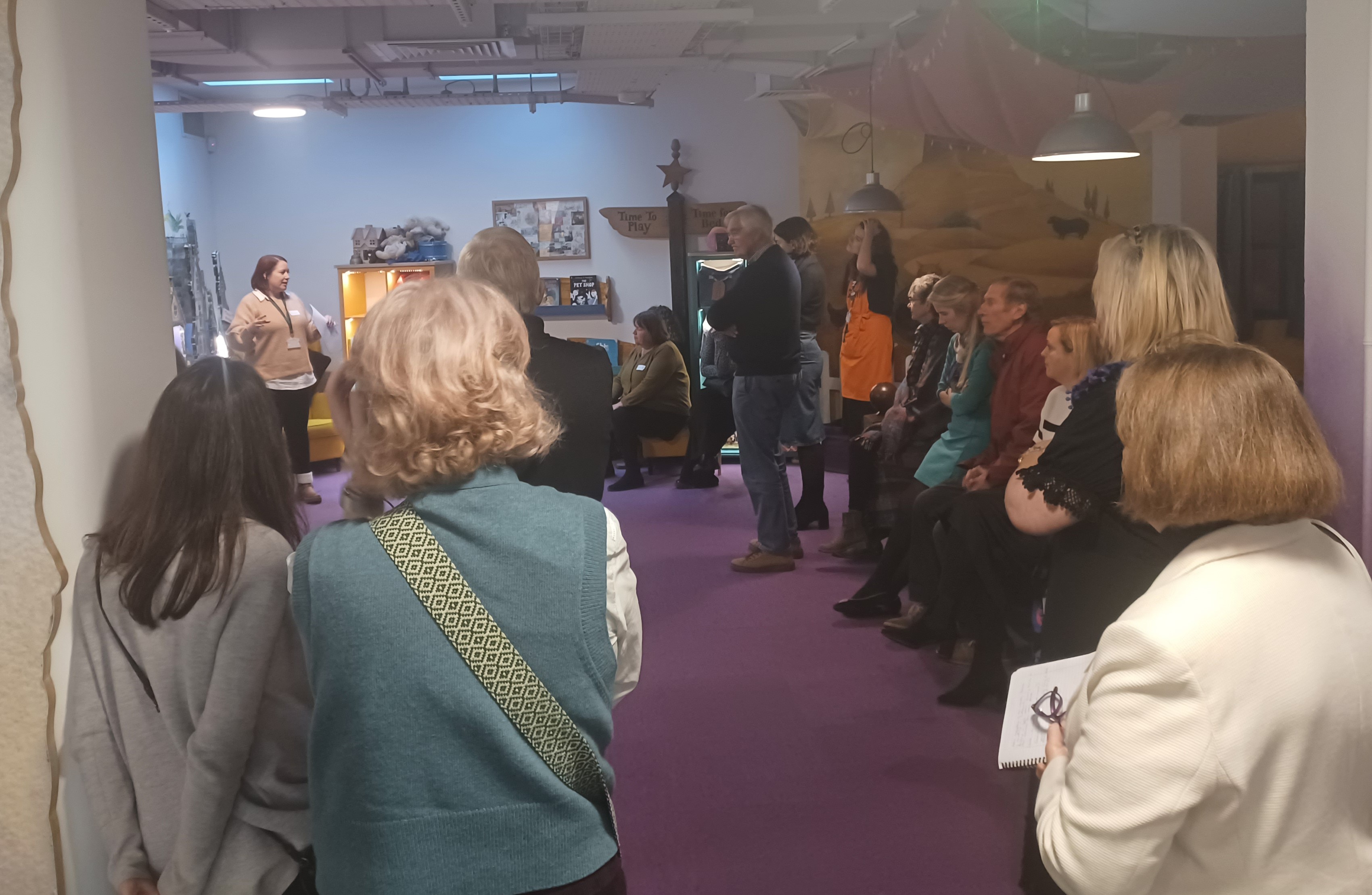 Staff from the The Story Museum took us into their small world area to deliver a section on their community outreach work with Growing Minds. After exploring the room, Victoria Jones, the Museum’s EYFS Co‑ordinator, gave us a captivating demonstration of their storytelling approach and the profound impact that it can have on people of all ages. Story Museum staff inspired families during a dozen Stay and Play sessions in Littlemore – our work shares numerous similarities, and it was a great opportunity to work together. Their sessions culminated in a visit by families to the Story Museum in early November, which went down a treat (and is well worth a visit!).
Staff from the The Story Museum took us into their small world area to deliver a section on their community outreach work with Growing Minds. After exploring the room, Victoria Jones, the Museum’s EYFS Co‑ordinator, gave us a captivating demonstration of their storytelling approach and the profound impact that it can have on people of all ages. Story Museum staff inspired families during a dozen Stay and Play sessions in Littlemore – our work shares numerous similarities, and it was a great opportunity to work together. Their sessions culminated in a visit by families to the Story Museum in early November, which went down a treat (and is well worth a visit!).
Lessons learned:
We reflected on what we had learned over the past few months, and our progress on the action plan from our independent evaluation. For example:
- We initially relied heavily on statutory services for recruitment or registrations of families. These referrals from birth registrars are very important as they allow families to hear about the local provision from very early in their child’s life. However, using a more mixed approach through social media, local advertising, schools, nurseries and other community groups means that our registration rate has significantly improved.
- Following feedback from families about the times of our Peep groups, we swapped the toddler group to the morning and babies to the afternoon, and attendance has improved.
- We piloted a community Transition group in the summer for Littlemore families whose children would be starting school outside the local area. This was less well attended than most of our groups, partly for logistical reasons – more than half those invited said they worked during the week. However, we’d also had less interaction with these families when children were younger, due to Covid. This really speaks to the power of the earliest contact with families, building relationships and being able to support them sensitively from when their babies are small. Families were still interested though, with several saying they would have found this type of course useful before starting nursery as well as school. We were still able to offer every family support, and an ideas mat of appropriate activities in preparation for school transition. We will reflect further on our learning in the design of these sessions later in this academic year.
Partnership working and future opportunities:
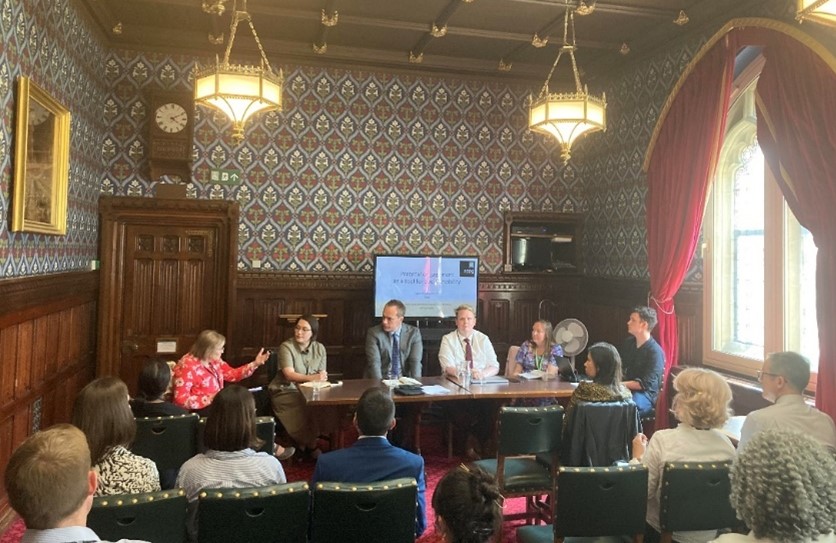 We were invited by the Sutton Trust to speak about Growing Minds at the Social Mobility All Party Parliamentary Group (APPG) at the House of Commons in July. The theme was parental engagement as a tool for social mobility, and it was an honour to share our learning around engaging with parents as early as possible in children’s lives.
We were invited by the Sutton Trust to speak about Growing Minds at the Social Mobility All Party Parliamentary Group (APPG) at the House of Commons in July. The theme was parental engagement as a tool for social mobility, and it was an honour to share our learning around engaging with parents as early as possible in children’s lives.- Talking and working with other organisations to learn from each other is an important part of Growing Minds, both locally and further afield. Over the past few months we’ve enjoyed collaborating with organisations such as Oxford Inclusive Economy Partnership (OIEP), Oxford University's Brain Story and Thrive at Five in Stoke-on-Trent.
What next? (how we can help you and you can help us)
We hope you agree that our services are valuable – but they need to be funded. We still need some funding for this financial year (2023/24) and the next. There are (as yet) no government-funded Family Hubs in Oxfordshire.
Do get in touch:
- if you are, or you have any contact with, a local commissioner of family support services or other potential funders (individuals, companies or charitable trusts), who may like to find out more about what we do, or to come along to our next event.
- if you’re a parent, carer or professional who lives or works in Littlemore or Berinsfield, and you want to find out more or come along to one of our sessions, or signpost other local families.
- if you’re part of a like-minded project elsewhere and would like to share ideas.
Becky Young, Growing Minds Manager - email becky.young@peeple.org.uk or tel 01865 395145
Parent story (short version):
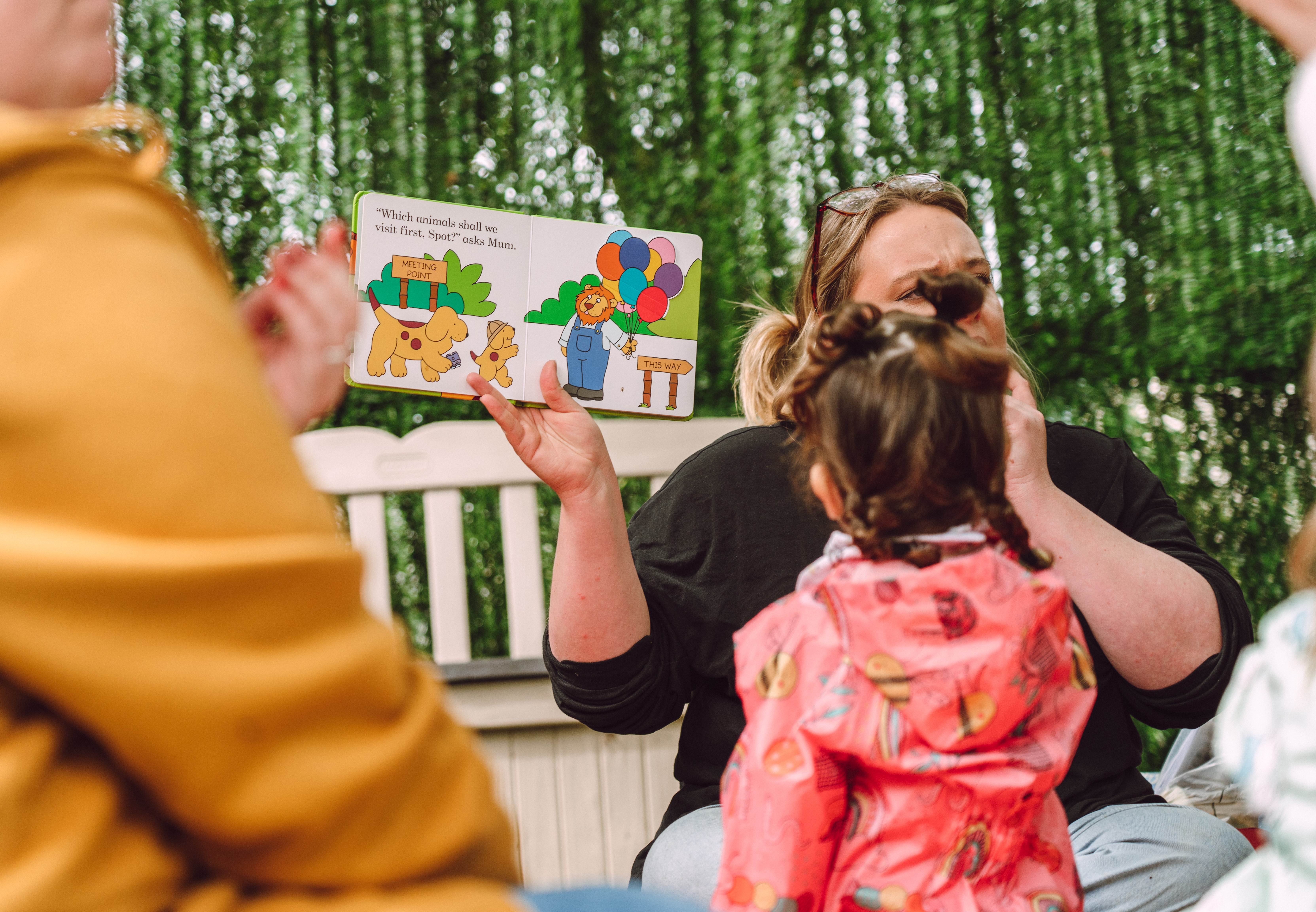 “I was a bit nervous the first time but everyone at Growing Minds and the Berin Centre was really welcoming. The first group I came to was a baby group. Each week is different, you learn so much and it's to improve your knowledge of certain things so you can enhance your child's life for the better. It was important for me to not just sit in the house with my little girl, it gets us out and interacting with people that we normally wouldn't be.
“I was a bit nervous the first time but everyone at Growing Minds and the Berin Centre was really welcoming. The first group I came to was a baby group. Each week is different, you learn so much and it's to improve your knowledge of certain things so you can enhance your child's life for the better. It was important for me to not just sit in the house with my little girl, it gets us out and interacting with people that we normally wouldn't be.
There's quite a lot of us who have similar ages of children, it's really good to see the same people every week, it helps us build the relationships. It's amazing, the other parents and their kids – it was really nice and friendly but if you're having a bad day like you can just tell someone and they'll try and help you. There won’t be any judgement which is really good because my life is chaos.
In the groups, we learn things to do with a child. There was something to do with the brain and I can see the image, that's really stuck with me. I'm quite a visual person so that really helped me. One week we also did about routines. I have difficulty with some of it and it was really reassuring that everyone goes through it which is a relief, and you can talk about it.
I also liked the making marks one that we did which was basically just like messy play. She didn't really get too dirty which was good for me, but she's done it since and she loves it, then I think oh I could do water play at home or I can do this at home - it's just fun.
This is somewhere that you're accepted and listened to. I just think how amazing spaces are like this. I've always wanted a child, I will do anything for her. I just want her to have the best life and coming here definitely helped that and it helps me as well. Parenting is hard, especially when social media says ‘do this’, ‘don't do this’ and it's so conflicting, you just want the best for you and your child. Mum guilt is so difficult but here they encourage you. I feel more connected with the other parents.”
Blog: Growing Minds - lessons learned about collaborative community support
Feature box colour:
"I just want her to have the best life and coming here definitely helped that and it helps me as well... Mum guilt is so difficult but here they encourage you. I feel more connected with the other parents.”
Read one parent's story below.
Find out more about getting involved with Growing Minds, as a parent, practitioner, commissioner or funder:
email becky.young@peeple.org.uk or tel 01865 395145
Side Quote Color:
Blog: What does school readiness look like?
School readiness is always a hot topic at this time of year, but especially now as the early years Covid cohort starts to transition into primary school. Many of these children will have spent a large proportion of their childhood in lockdown, missing out on the opportunity to socialise with their peers and develop key skills. A recent survey conducted by YouGov suggested that half of all children are not ready to start school, and in some settings that has risen to 90%.
But what does being 'school ready' actually mean? A few years ago Ofsted (who inspect schools and children's services in England) released a list of skills that would be helpful for children to have before starting school - and parents may be surprised to learn that phonics, writing and maths are not on the list.
Here are some of the skills that are useful to practise with your child in everyday life:
I can sit still and listen
Schools don't expect children to sit still and listen for the whole day - that's hard even for grown ups - but developing listening skills is essential to communication, play, keeping safe and developing thinking and concentration skills. Model good listening with your child, chat with them and really listen to their responses. In order to become a good listener, children need to know what it feels like to be listened to.
I am aware of other children
Relationships with the people around us are so important and children learn a lot about appropriate behaviour and 'rules' which can help them get on with others. Children learn from everyone! Watch your child next time they play with others and talk to them about how they interact with their friends. Relationships are at the heart of leaning, whether it's in the playground or in the classroom.
I can talk in sentences and I can speak to an adult to ask for help
Talking helps children to develop their thinking and builds confidence - children get better at it when they have somebody who joins in, talks, listens and tries to understand. This confidence will seep into other areas: asking for help, communicating with friends and expanding language.
I am potty trained and can go to the toilet
Everyday activities encourage children to learn how to look after themselves. Routines such as using the toilet, wiping, flushing, pulling pants up and washing hands is a sequence which can be repeated again and again. This in turn grows independence, and will save you - and school staff - a lot of time in the bathroom. If there is a part of the sequence that a child is struggling with, such as remembering to flush, it's worth breaking the routine down and focusing efforts on helping them master that particular part.
I can recognise my own name
Names are a core part of our identity and using children's names in a positive way builds confidence and self esteem. Help children to recognise their own name by celebrating it! Make name placemats for dinner or write it in bubble writing and get them to decorate it - the added bonus is that having fun together with your child's name shows them that they are important.
I can open and enjoy a book
Have you ever had to read your child's favourite book over and over again? This familiarity with language, characters and pictures breeds confidence and encourages children to become 'readers' themselves. Knowing what happens next, joining in with the re-telling (made up or from memory, rather than reading the text themselves) and being able to name familiar things in pictures gives children a real sense of achievement. It's an important building block in learning to read and will spur them on to open, and enjoy, new books as well as old favourites.
I can understand the word 'No' and the borders it sets for behaviour, and I understand the word 'stop' and that such a phrase might be used to prevent danger
Children sometimes struggle to put into words what they are feeling, so their feelings come out in their behaviour. Support and encouragement is important, as is staying safe. Talk to your child about how words such as 'stop' may be used to keep them out of danger - explore songs and stories which will communicate this in a positive way.
I can take off my own coat and I can put on my own shoes
Life skills such as taking off a coat and putting on shoes are often the first big steps towards independence for young children. We do these everyday tasks without thinking but children need us to break it down into chunks for them to be able to grasp them. Time and patience are needed here, and maybe a little bit of fun too. Have you ever seen the coat flip? Look it up, it's genius!
Making these skills a part of daily life will help with the transition into school, and the familiarity of these tasks will underpin confidence at the start of the school journey. If your child isn't at this stage yet, do not worry - teaching and support staff will be there to encourage and help all children.
If you are a Peep practitioner then log into your Members area and search transition or school readiness - you will find Peep resources to support each of the skills listed above.
Blog: What does school readiness look like?
Feature box colour:
Side Quote Color:
blog: Ayrshire College leads with innovative early years offer
 Ayrshire College are leading the way with an innovative Early Years offer to students which includes the opportunity to support Peep delivery alongside Peep-trained Lecturers. The focus within further education training for early years is child-centred, and Peep offers a practical solution which equips students with the skills to work with parents and carers alongside the child, something the sector have been trying to find a way to include for some time.
Ayrshire College are leading the way with an innovative Early Years offer to students which includes the opportunity to support Peep delivery alongside Peep-trained Lecturers. The focus within further education training for early years is child-centred, and Peep offers a practical solution which equips students with the skills to work with parents and carers alongside the child, something the sector have been trying to find a way to include for some time.
Lecturers at Ayrshire College identified a gap in learning opportunities for students who wanted to improve their skills and experience in communicating and engaging with parents, alongside working with children. The Peep Learning Together Programme (LTP) was considered the most effective learning tool for strengthening these skills. Lyndsey Pack, Curriculum Manager for Early Years Education at Ayrshire College explains: ‘Initially, Peep offered us an opportunity for our students to plan and deliver weekly sessions with the involvement of children and families. This was crucial for them to achieve the assessment criteria around 'Play for Children and Young People' and build a portfolio of play experiences based around their Peep sessions. However, over the past few years, it has grown into so much more. The students increase their confidence in the context of family learning which is invaluable to them, parents and carers and children alike. They also develop crucial softer skills such as communication and active listening as well as reflection, evaluation and planning.’
College lecturers became Peep practitioners assisted by ELC students, to support families...
Lecturers became Peep practitioners, and SCQF Level 6 Early Learning and Childcare (ELC) students assisted in the delivery of Peep sessions, which ran every week on each of the main Ayrshire College campuses. These sessions were well attended by parents, carers, childminders and grandparents. The students gained hands-on experience, as well as an insight into the benefits of family engagement. Student Megan comments ‘Peep gave me an amazing opportunity to plan and implement activities for children and their families. One activity in our Peep session was making musical instruments from household items. It was a huge success with the children and demonstrated the importance in allowing families time to engage and have fun with each other. Peep taught me the importance of parental involvement in their child’s learning and how little things can make a huge difference to children’s learning and development.’
The Covid pandemic forced the students to adapt, moving sessions outside and taking precautions to keep everyone safe. For those who could not attend Peep groups during the pandemic, students created a Peep Facebook page as a way to share learning and connect with families. This online community continues to grow and includes a range of students, practitioners, parents and those with a keen interest in Early Learning and Childcare. Students also developed a successful Peep podcast, hosted and developed by themselves, to reach a wider audience.
... then college lecturers became Peep trainers, and trained students to be Peep practitioners themselves
Students on the one year HNC Childhood Practice course had placements in a local authority or private nursery and took part in delivering Forest Kindergarten (FK), run by lecturers. Both placements gave the opportunity to work with children, with students actively encouraged within FK delivery to work with the parents too during these sessions. This hands-on Peep approach was so successful that college students expressed an interest in becoming Peep trained themselves through the Learning Together Programme. In response to this, Ayrshire College set up a Training and Support Agreement (TSA) with Peeple: lecturers became Peep trainers and were able to offer 12 students places on the 2-day Learning Together Programme Training, which also includes on-going access to the programme and post-delivery support. Rachel is a HNC student who took the training: ‘I have loved supporting Peep delivery and have a real passion for the Peep principles and the way it encourages parents to share in and help their child’s learning without costing a fortune. As a student I wanted to do the qualification as it will be something I can use in the future as a tool to support parents. I love everything about Peep but seeing the children getting so excited in play with their parent/carer makes me so happy.’
These highly employable students will continue to help strengthen parent - child relationships and support parents in improving the home learning environment by valuing and extending everyday learning opportunities. Curriculum Manager Lyndsey Pack is equally proud of their achievements: ‘When I became a Peep Practitioner in 2019 I would never have imagined that one day I would be a Peep Trainer. I am so proud of our first cohort of students who are entering the workforce as Peep Practitioners, ready to work directly with families to improve the lives of the children in our community.’
For more information on how Peep could work in your education setting contact Laura Niven, Peeple Qualifications Manager via email: laura.niven@peeple.org.uk or twitter @Peeple_Laura.
Blog: Ayrshire College EY students delivering Peep
Feature box colour:
Side Quote Color:
information for learners - peep progression pathway
Thank you for your interest in participating in the Peep Progression Pathway as a parent or carer. Here you will find information to help you decide if it is for you (leaflet and Sway below), and then to get going (learner handbook, registration form and procedures). Your local Peep Practitioner will be your first point of contact, but do also feel free to contact us: pathway@peeple.org.uk.
> Peep Progression Pathway leaflet for parents and carers - PDF to download or Sway to read on screen
Feature box colour:
Side Quote Color:
information for organisations - delivering the peep progression pathway
Peep Progression Pathway qualification units for parents are delivered and assessed by practitioners who have completed Peep Learning Together Programme (LTP) Training and Peep Progression Pathway Training, and are part of a local Delivery Centre (see below). Units are awarded by SCQF and are credit rated by SQA. Full guidance and procedures are provided in the training.
Join our next free Pathway Information Session for practitioners and managers
to find out more about using the Peep Progression Pathway with your local families:
Thursday 25th April 3.30- 4.30pm
> Email us and we'll send you a Teams link for your calendar: pathway@peeple.org.uk
You can deliver the Pathway units as part of your usual Peep groups sessions. For each assessment criterion there are several LTP topics that you (and families) can choose between, so that you can build a course which suits local interests and needs.
The units are assessed entirely by portfolio with each assessment criterion linking to a single portfolio page. Through this portfolio the parents reflect on their own child’s development and their role as first educator. This enables them to recognise their existing skills and knowledge and build on these through the session content and its application in everyday life.
The qualifications units are recognised by Ofqual (the Office of Qualifications and Examinations Regulation in England) on the Regulated Qualifications Framework (RQF - which accredits qualifications in England, Wales and Northern Ireland).
Pathway units are being successfully delivered with learners in a variety of settings across the UK, including:
- in Peep groups or one-to-one in the home - indoors or outdoors
- through social work with foster carers, kinship carers and volunteers
- in community centres, libraries, early years settings, schools and health centres
How to become a delivery centre for the peep progression pathway
Organisations or individuals wishing to deliver the Peep Progression Pathway will work with Peeple. They will become a Delivery Centre and a member of staff will take the Internal Quality Assurance (IQA) role. Peeple will support the organisation to source an IQA officer where this is not possible. The practitioner will usually act as the assessor too.
A delivery centre is an organisation, local authority or constituted group that has the capacity to deliver the Peep Progression Pathway, carry out Internal Quality Assurance (IQA) and liaise with Peeple on External Quality Assurance (EQA).
Every delivery centre must have:
- identified at least one suitable Internal Quality Assurance (IQA) Officer
- identified at least one suitable Assessor
- the capacity and administration processes to collect and safely store learner information
- signed service level agreement and data sharing agreement
- organisational policies and procedures in place that support effective responses to learner needs, complaints or appeals.
Costs payable to Peeple:
- Delivery Centre set-up fee (one-off cost per centre): £70 + vat
- Annual Delivery Centre fee (per centre - including access to database for Pathway learner records, website, support): £50 + vat
- Peep Progression Pathway Training - for each new Pathway practitioner/ assessor: £160 + vat pp
- Fee per learner (ie parent/ carer) including portfolio, quality assurance and SQA certification: £10 per unit per learner
> For further details please see our Guide: How to become a Peep Progression Pathway Delivery Centre.
the learner journey
Take a look at our flowchart, which shows the journey a learner may take on the Peep Progression Pathway.
If possible, it's good practice to encourage all parents to create a portfolio showing how they have reflected on Peep learning and put it into practice, even if they don’t want to submit it for formal recognition. Completed portfolios are like a ‘keepsake book’, and parents treasure them both as a reflection of their own learning and as a keepsake about their child. They may contribute evidence to show the impact of Peep sessions and can also be a useful resource for parents to share with professionals during development checks or transition meetings, for example.
The social practice model of learning offered by the Peep Progression Pathway supports parents to build ‘learner identity’. This makes further learning or vocational progression more likely, and has a range of other wellbeing benefits. There will be a number of progression options for learners to explore, including further studying, volunteering or seeking employment.
find out more:
peep progression pathway - Scotland
Feature box colour:
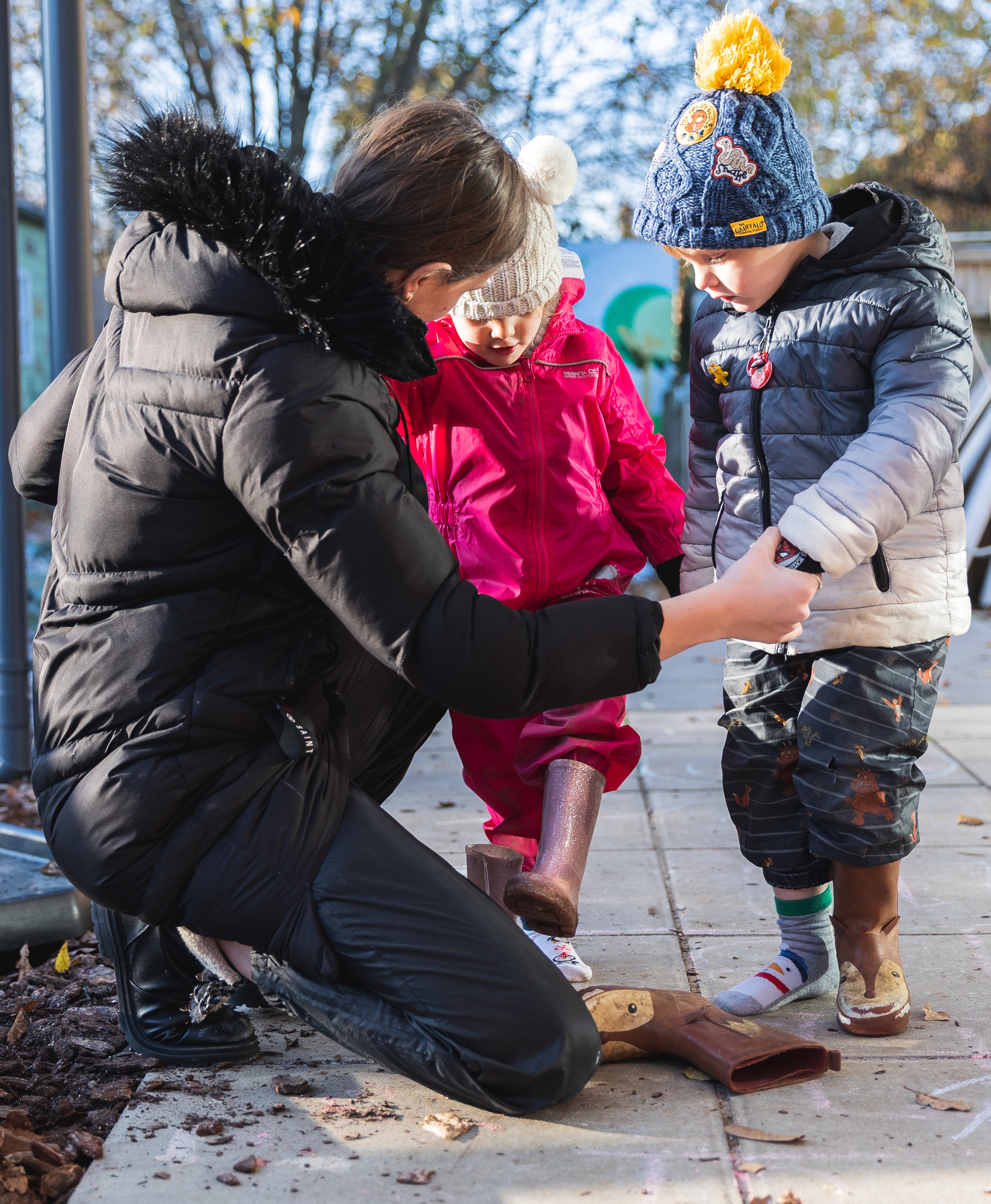
Side Quote Color:
Maths in everyday routines
Everyday routines and activities are full of maths! They include lots of opportunities for your baby or child to explore numbers, counting, space, shapes, patterns, sorting and matching.
The conversations that you have with your child at these times are often rich in maths language – these will help your child to understand maths ideas as well as the words used to describe them.
